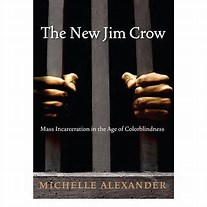The New Jim Crow: Mass Incarceration in the Age of Colorblindness by Michelle Alexander
(Copyright 2010, 2012 by Michelle Alexander, The New Press)
There are books that hit you in your head and heart and make sense of things you’ve seen and felt but had not put together in the same way as the author.
When I was in high school both Black Skin, Black Masks by Franz Fanon and The Souls of Black Folk by W.E.B. Du Bois had a similar impact but they were so densely written and somewhat over my head as a junior & senior in high school.The New Jim Crow by Michelle Alexander is in this league except it is more accessibly written – although just as eloquent.
It took me the whole summer to read it, not just because this has been an extremely busy and complicated summer on the personal and work front, but because I had to put it down as I recoiled from the pain, anger, and dismay it brought forth.
The best way I can encourage anyone who reads this blog post about the importance of getting this book and reading it and sharing it with as many people as you can, especially young Black men, is to quote from it. So, following are quotes from throughout the book that I am sharing. Note that I could choose several sets of different quotes to share – the book is that powerfully written.
The American penal system has emerged as a system of social control unparalleled in world history….This is an astonishing development, especially given that as recently as the mid-1970s, the most well-respected criminologists were predicting that prison system would soon fade away. Prison did not deter crime significantly, many experts concluded. Those who had meaningful economic and social opportunities were unlikely to commit crimes regardless of the penalty, while those who went to prison were far more likely to commit crimes again in the future. (p. 8)
In October 1982, President Reagan officially announced his administration’s War on Drugs. At the time he declared this new war, less than 2 percent the American public viewed drugs as the most important issue facing the nation. This fact was no deterrent to Reagan, for the drug war from the outset had little to do with public concern about drugs and much to do with public concern about race. (p. 49)
Other courses emphasized that granting police the freedom to stop, interrogate, and search anyone who consented would likely lead to racial and ethnic discrimination.
The (Supreme) Court long acknowledged that effective use of consent searches by the police depends on the ignorance (and powerlessness) of those who are targeted….consent searches are valuable tools for the police only because hardly anyone dares to say no. (p. 66)
From the outset, the drug war could have been waged primarily in overwhelming white suburbs or on college campuses…Instead, when police go looking for drugs, they look in the ‘hood. Tactics that would be political suicide in an upscale white suburb are not even newsworthy in poor black and brown communities. So long as mass drug arrests are concentrated in impoverished urban areas, police chiefs have little reason to fear a political backlash, no matter how aggressive and warlike the efforts may be.” (p. 124)
The “whites only” signs may be gone, but new signs have gone up – notices places in job applications, rental agreements, loan applications, forms for welfare benefits, school applications, and petitions for licenses, informing the general public that “felons” are not wanted here. A criminal record today authorizes precisely the forms of discrimination we supposedly left behind – discrimination in employment, housing, education, public benefits, and jury service. Those labeled criminals can even be denied the right to vote. (p. 141)
Saying that one does not care about race is offered as an exculpatory virtue, when in fact it can be a form of cruelty. I t is precisely because we, as a nation, have not cared much about African Americans that we have allowed our criminal justice system to create a new racial undercaste. (p. 241)
But if your strategy for racial justice involves waiting for whites to be fair, history suggests it will be a long wait. It’s not that white people are more unjust than others. Rather it seems that an aspect of human nature is the tendency to cling tightly to one’s advantages and privileges and to rationalize the suffering and exclusion of others. This tendency is what led Frederick Douglass to declare that “power concedes nothing without a demand; it never has and it never will.” (p.258)
I highly recommend this book (in case you couldn’t tell).
<><><><><><><>
Related:


I read The New Jim Crow a couple of years ago and also attended a dialogue with the author Michelle Alexander at Harvard Law School. She was so right on point with the accurate comparisons of post-Civil War Jim Crow and the current penal and surreptitious (and not so) policies that keep black and poor people oppressed. Thanks for keeping Ms. Alexander’s book in the forefront. Another good example is Ta-Nehisi Coates’ article of Reparations for African Americans in Atlantic magazine.
I so wish I’d known Ms. Alexander was in town.I would have loved to see her. Haven’t caught her on any of the news programs. Please feel free to forward names of books and articles that you think I should be aware. of. Thanks for reading and commenting on my posts.